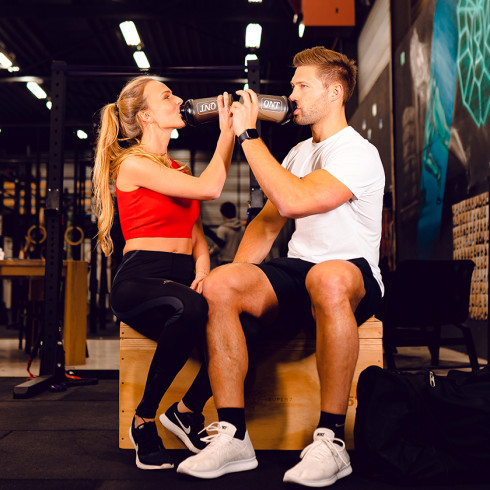The secrets of a perfect meal for gaining muscle mass: foods, plans, and tips
TABLE OF CONTENTS
- Which foods should you prioritize for muscle gain?
- Protein quality
- How to organize your meals for effective muscle gain?
- Pre- and post-workout meals: boost your performance and recovery.
- What diet plan to follow for muscle gain without excessive fat?
- Example menu for muscle gain.
- The importance of sleep and recovery
- Which products can help with muscle gain?
- Coach's tips
WHICH FOODS SHOULD YOU PRIORITIZE FOR MUSCLE GAIN?
Muscle gain is a process that requires precise and tailored nutrition. The right food choices not only stimulate muscle growth but also help prevent excessive fat gain. To maximize your results, it's essential to focus on nutrient-dense and high-quality calorie-rich foods. Here are the main food groups to prioritize for effective muscle gain:
Lean Proteins
Proteins play a crucial role in muscle gain as they provide the essential amino acids needed for muscle repair and growth after a workout. It is recommended to consume approximately 1.6 to 2.2 g of protein per kilogram of body weight to optimize muscle gain.
Here are some particularly effective sources of lean protein:
- Chicken: Low in fat and rich in protein, chicken is a staple food for muscle building.
- Lean beef: High in protein and natural creatine, lean beef promotes strength and muscle growth.
- Turkey: A lean protein source similar to chicken, turkey is also rich in tryptophan, an amino acid that aids recovery.
- Fatty fish like salmon: In addition to their protein content, fatty fish like salmon are rich in omega-3 fatty acids, which help reduce inflammation and support muscle recovery.
- Eggs: Eggs are a complete protein source containing all essential amino acids, and the yolk is packed with nutrients like vitamin D and healthy fats.
What Type of Protein is Best for Muscle Gain?
- Animal proteins (chicken, beef, eggs, fish) are often considered the best for muscle gain because they contain all essential amino acids. However, plant-based proteins (lentils, chickpeas, tofu) can also be effective if combined properly to achieve a complete amino acid profile.
Complex Carbohydrates
Carbohydrates are the primary energy source for your muscles and body during intense training. In addition to fueling your workouts, they help replenish glycogen stores in the muscles, promoting better recovery. Prioritize complex carbohydrates for a slow and steady energy release, avoiding blood sugar spikes.
Here are examples of complex carbohydrates to include in your diet:
- Brown rice: A staple carbohydrate source for athletes, brown rice is high in fiber and provides a gradual release of energy.
- Sweet potatoes: Rich in vitamins A and C, and antioxidants, sweet potatoes are an excellent choice for muscle gain while aiding recovery.
- Oats: In addition to being a good source of fiber, oats are easy to incorporate into meals or protein shakes.
- Quinoa: Besides being rich in carbohydrates, quinoa also contains complete proteins, making it an excellent choice for maximizing nutrient intake.
How Many Carbohydrates Should I Consume for Muscle Gain?
- A good starting point is to consume approximately 4 to 6 g of carbohydrates per kilogram of body weight per day. For example, for an individual weighing 80 kg, this would equate to 320 to 480 g of carbohydrates.
Healthy Fats Healthy fats play an important role in hormone production, such as testosterone, which is essential for muscle growth. Additionally, fats provide a dense energy source, helping to achieve the calorie surplus necessary for muscle gain. However, it is important to choose healthy fats to avoid negative health effects.
Here are some healthy fat sources to include:
- Avocados: Rich in monounsaturated fats, avocados contribute to heart health and proper hormone production.
- Nuts and seeds (almonds, walnuts, chia seeds): These foods are rich in healthy fats, fiber, and protein, as well as essential vitamins and minerals like magnesium and zinc.
- Olive oil: An ideal source of monounsaturated fats, olive oil is also rich in antioxidants, promoting muscle recovery.
- Fatty fish (salmon, mackerel, sardines): In addition to their protein content, these fish are rich in omega-3 fatty acids, which reduce inflammation and support muscle regeneration.
Dietary Supplements
Dietary supplements can help fill nutritional gaps and make it easier to meet calorie needs, especially when food volume becomes overwhelming. Here are some particularly useful supplements for muscle gain:
- Protein powder: A convenient way to increase your protein intake, especially after workouts to optimize muscle recovery. Whey protein is rapidly absorbed and ideal for post-workout use.
- Creatine: One of the most researched supplements for improving strength and hypertrophy. Creatine helps boost energy production (ATP) during intense exercises and promotes intracellular water retention, aiding in muscle gain.
- BCAAs (branched-chain amino acids): BCAAs are essential for muscle protein synthesis and can help reduce fatigue and improve recovery during and after workouts.
How Many Grams of Protein Per Day to Build Muscle?
- The recommended intake for effective muscle gain is 1.6 to 2.2 g of protein per kilogram of body weight per day. For example, a person weighing 70 kg should consume between 112 and 154 g of protein daily.
To optimize muscle gain, it is essential to consume a variety of nutrient-rich foods while maintaining a balance between proteins, carbohydrates, and fats. By incorporating lean proteins, complex carbohydrates, healthy fats, and dietary supplements if necessary, you will provide your body with everything it needs to support muscle growth and recovery after training.
QUALITY OF PROTEINS
Animal proteins (such as those found in meat, eggs, dairy, and fish) are often considered complete proteins because they contain all the essential amino acids your body needs for muscle synthesis.
Plant-based proteins, on the other hand, do not always contain all essential amino acids or may have them in insufficient quantities (often lacking in amino acids like lysine or methionine). Therefore, vegetarians and vegans need to pay attention to combining different plant-based protein sources to achieve a complete amino acid profile. For example, pairing legumes (lentils, chickpeas) with grains (rice, quinoa) can fill these gaps.
Bioavailability
The bioavailability of plant-based proteins is generally slightly lower than that of animal proteins, meaning your body may absorb and utilize plant proteins less effectively. If your diet is primarily plant-based, you may want to consider consuming slightly more than the 2.2 g/kg recommended to offset this difference.
Practical Recommendation
If you consume mainly animal proteins, 2.2 g per kilogram of body weight should suffice to optimize muscle gain. For those relying primarily on plant-based proteins, it would be wise to increase this intake slightly to around 2.5 g/kg to account for the lower bioavailability and ensure a good amino acid profile.
You can count both animal and plant-based proteins in your daily protein total, but if your diet is plant-based, it’s recommended to increase this intake slightly to maximize muscle growth.
HOW TO ORGANIZE YOUR MEALS FOR EFFECTIVE MUSCLE GAIN?
Meal planning is a key element for successful muscle gain. To maximize muscle growth while minimizing fat gain, it’s important to structure your meals strategically, focusing on both frequency and the distribution of macronutrients (proteins, carbohydrates, and fats). A good meal plan will help you maintain a consistent calorie intake, ensure optimal recovery, and maximize muscle protein synthesis.
Meal Frequency: How Many Meals Per Day for Muscle Gain?
For effective muscle gain, it is generally recommended to divide your daily calorie intake into 5 to 6 smaller meals per day. This approach offers several benefits:
- Constant nutrient supply: Eating frequently ensures a continuous supply of nutrients to your body, promoting better protein synthesis throughout the day.
- Avoiding energy spikes and crashes: Carbohydrates are the primary energy source during training. Spreading your carb intake across multiple meals helps maintain stable energy levels and prevents fatigue.
- Calorie management: If you need to consume a large number of calories for muscle gain, it can be challenging to do so in just 3 meals. Dividing your meals allows you to meet your calorie target without feeling too heavy.
Example Meal Distribution:
- Breakfast: A meal rich in carbohydrates and protein to start your day.
- Morning snack: A protein shake or a snack with dried fruits and protein.
- Lunch: A balanced meal with protein, complex carbohydrates, and healthy fats.
- Pre-workout snack: A small meal to boost your performance during training.
- Dinner: A meal rich in protein and carbohydrates to replenish your glycogen stores.
- Bedtime snack: A protein-rich snack to nourish your muscles overnight (e.g., Greek yogurt, casein protein).
5 to 6 meals per day is an ideal frequency to maintain a consistent protein intake and support gradual muscle gain. If you prefer fewer meals, just make sure to meet your calorie and macronutrient goals.
Macronutrient Distribution: Balance Between Proteins, Carbohydrates, and Fats
Each meal should contain an appropriate amount of proteins, carbohydrates, and healthy fats. Here’s a typical distribution:
Proteins: Every meal should include a protein source to stimulate muscle synthesis. Aim for approximately 20 to 40 g of protein per meal, depending on your body weight and goals.
Carbohydrates: Carbohydrates are essential for providing the energy needed for workouts and replenishing muscle glycogen stores. Focus on consuming complex carbohydrates like rice, whole-grain pasta, and sweet potatoes.
Healthy Fats:
Fats are important for hormone production and vitamin absorption. Include sources of healthy fats such as avocados, nuts, and olive oil in every meal, but keep consumption moderate to avoid uncontrolled caloric surplus.
PRE- AND POST-WORKOUT MEALS: BOOST YOUR PERFORMANCE AND RECOVERY.
Pre-Workout Meal
The pre-workout meal is crucial to provide the energy needed for optimal performance at the gym. It should consist of easily digestible carbohydrates to boost glycogen stores and protein to prevent muscle breakdown during training.
- When to eat: Ideally, consume this meal 1 to 2 hours before your workout.
- Example pre-workout meal: A bowl of oatmeal with protein powder, fruit, and a spoonful of almond butter.
Post-Workout Meal
The post-workout meal is just as important, as it helps maximize muscle recovery and replenish glycogen stores. After training, your muscles are particularly receptive to nutrient absorption. This meal should include a good dose of protein for muscle synthesis and fast-digesting carbohydrates to recharge energy reserves.
- When to eat: Within 30 to 60 minutes after your workout.
- Example post-workout meal: A protein shake with a banana, or grilled chicken with white rice and vegetables.
What to Eat Before and After Training for Muscle Gain?
- Before training: Focus on quick-digesting carbohydrates and proteins (e.g., oatmeal with fruits and Greek yogurt).
- After training: Quick-digesting proteins (whey) and carbohydrates to optimize recovery (e.g., a protein shake with fruits, or a solid meal like chicken and rice).
High-Calorie Snacks: Extra Fuel for Muscle Gain
Between main meals, snacks are an effective way to add calories and nutrients to support muscle gain. These snacks should be high in calories but also rich in quality macronutrients (proteins, carbohydrates, and healthy fats).
Here are some quick and easy snack ideas:
- Homemade protein shake: Blend protein powder, oats, almond milk, a banana, and a spoonful of peanut butter for a caloric and nutritious boost.
- Greek yogurt with dried fruits and nuts: High in protein and healthy fats.
- Avocado toast with boiled eggs: A balanced snack combining protein and healthy fats.
- High-calorie smoothie: A smoothie made with milk, oats, fruit, almond butter, and protein powder can give you a significant caloric boost.
These snacks not only help you meet your calorie goals but also provide essential nutrients to maintain your energy levels throughout the day.
For effective muscle gain, a well-organized meal plan is essential. Distributing your calorie and macronutrient intake across 5 to 6 meals per day while ensuring a balanced consumption of proteins, carbohydrates, and fats is a key strategy. Pre- and post-workout meals play a crucial role in performance and recovery, while high-calorie snacks can help you meet your energy needs.
WHAT DIET PLAN SHOULD YOU FOLLOW TO GAIN MUSCLE WITHOUT GAINING TOO MUCH FAT?
When aiming to build muscle mass, it’s common to worry about gaining excess fat. However, with a well-planned dietary strategy, you can increase muscle mass while minimizing fat gain. The key principle is to adjust your calorie intake based on your energy needs while carefully managing the distribution of macronutrients. The goal is to achieve a moderate caloric surplus, enough to promote muscle growth without excessive intake that could turn into body fat.
Controlled Caloric Surplus: How Many Calories to Add for Muscle Gain Without Fat?
To effectively build muscle without gaining excess fat, aim for a moderate caloric surplus. Instead of massively increasing your calorie intake, which could lead to fat storage, a surplus of 300 to 500 calories above your basal metabolic rate is a more sustainable approach.
- Calculating your Basal Metabolic Rate (BMR): Start by calculating your BMR, which represents the number of calories your body needs to maintain vital functions at rest. Then add your physical activity level (including workouts) to determine your total caloric needs.
- Gradual increase: Once you have your total caloric needs, add about 300 to 500 calories per day. This surplus gives your body enough energy to build muscle without excessive fat storage.
- Monitoring and adjustments: Regularly track your progress by taking body measurements (waist, arms, weight) and observing your training performance. If you notice you're gaining fat too quickly, slightly reduce your calorie intake. Conversely, if you're not building enough muscle, slightly increase your calories.
Macronutrient Distribution: Finding the Balance to Limit Fat Gain
Once you’ve determined your calorie intake, it’s essential to correctly distribute your macronutrients (proteins, carbohydrates, fats) to maximize muscle growth and minimize fat gain.
- Proteins: As mentioned earlier, aim for 1.6 to 2.2 g of protein per kilogram of body weight. Proteins are crucial for muscle synthesis and help minimize muscle loss during the muscle-building phase. They also have a thermogenic effect, meaning they slightly increase energy expenditure during digestion.
- Carbohydrates: Carbohydrates are essential for energy, especially if you train intensively. Prioritize complex carbohydrates such as brown rice, sweet potatoes, oats, and vegetables for a steady energy release. Adjust your carbohydrate intake based on your physical activity: the more intense your training, the more carbohydrates you’ll need.
- Fats: Fats are also important for hormone production (especially testosterone) and overall health. Be sure to consume healthy fats (avocados, nuts, olive oil), but keep consumption moderate (around 20 to 30% of your total calorie intake).
Example Macronutrient Distribution for Someone Consuming 3000 Calories Per Day:
- Proteins: 2 g/kg for a person weighing 75 kg = 150 g of protein (~600 calories).
- Carbohydrates: 50% of the total caloric intake = 375 g of carbohydrates (~1500 calories).
- Fats: 25% of the total caloric intake = 83 g of fats (~750 calories).
Monitoring Muscle Gain: Adjusting Based on Results
During a muscle gain phase, it’s important to monitor your progress regularly. The ideal weight gain is around 0.25 to 0.5 kg per week. Faster gains may indicate excessive fat accumulation, while slower gains may mean your caloric surplus isn’t sufficient.
- Weekly weigh-in: Weigh yourself weekly at the same time (ideally in the morning after using the restroom) to track your progress.
- Body measurements: In addition to weight, take measurements (waist, arms, thighs, etc.) to assess whether your gains are primarily muscle or if you’re gaining too much fat.
- Adjustments: If you notice you’re gaining more fat than muscle, reduce your calorie intake by 100 to 200 calories per day. If weight gain is too slow or nonexistent, increase your calories slightly by the same amount.
Optimizing Training and Recovery for Lean Muscle Gain
Nutrition alone isn’t enough. Your training and recovery are equally crucial factors for achieving muscle gain without excess fat.
- Resistance training: Follow a structured weightlifting program that emphasizes progressive overload (regularly increasing the weight lifted). Intense training promotes muscle growth and increases calorie expenditure, reducing the risk of fat storage.
- Moderate cardio: Contrary to popular belief, incorporating moderate cardio into your routine (2 to 3 sessions of 20 to 30 minutes per week) can help limit fat gain during a muscle-building phase without hindering muscle growth. Cardio improves insulin sensitivity and promotes the use of carbohydrates for energy instead of storing them as fat.
- Sleep and recovery: A good nutrition plan won’t be effective if you don’t get enough sleep. Sleep is essential for muscle recovery and hormonal regulation (especially testosterone and growth hormone secretion). Aim for 7 to 9 hours of sleep per night to maximize muscle gains and minimize fat accumulation.
To successfully achieve muscle gain without excessive fat gain, the key lies in a moderate caloric surplus, an intelligent macronutrient distribution, and regular monitoring of your progress. Combine this with intensive training and proper recovery to maximize muscle growth while minimizing fat accumulation.
EXAMPLE MENU FOR MUSCLE GAIN.
For successful muscle gain, it’s essential to have a well-structured meal plan. Providing an example of a daily menu can help visualize the distribution of meals and calorie intake throughout the day. The goal is to maintain a caloric surplus while ensuring sufficient intake of proteins, carbohydrates, and healthy fats to promote muscle growth. Here’s an example of a typical day to inspire you, based on consuming 5 to 6 meals per day.
Breakfast: Protein Omelet and Oatmeal
- 4-egg omelet (add spinach and tomatoes for extra vitamins and fiber)
- Oatmeal with berries and a teaspoon of chia seeds
- A whole fruit (such as a banana or an apple)
Breakfast is a crucial moment to start the day with a good dose of protein and complex carbohydrates. Eggs are an excellent source of complete protein, while oatmeal provides a slow release of energy due to its fiber content.
Morning Snack: Protein Shake
- Homemade protein shake: Blend protein powder, oats, a spoonful of peanut butter, and almond milk.
- A handful of almonds or walnuts.
This snack is convenient and easy to consume, especially if you're on the go. It provides a supply of protein to support muscle protein synthesis throughout the day and carbohydrates for energy.
Lunch: Grilled Chicken and Brown Rice
- 150 g of grilled chicken (or turkey as an alternative protein source)
- Brown rice or quinoa (about 100-150 g cooked)
- Steamed vegetables (broccoli, zucchini, or spinach)
- Olive oil or avocado for healthy fats.
Lunch is a central meal of the day to support your calorie intake. Chicken is a lean protein source, and complex carbohydrates like brown rice or quinoa help maintain your energy levels and replenish muscle glycogen stores.
Afternoon Snack: Protein Snack and Fruit
- Greek yogurt (about 200 g) with dried fruits (such as goji berries or raisins) and a handful of nuts.
- A fruit (e.g., an orange or a pear).
This snack is rich in protein and healthy fats, promoting satiety and preventing cravings before your workout. Dried fruits provide quick-digesting carbohydrates that give you an energy boost before training.
Dinner: Salmon, Sweet Potatoes, and Green Vegetables
- 150 g of salmon (or another fatty fish for omega-3 intake)
- Sweet potatoes (about 200 g)
- Steamed broccoli (or spinach, zucchini)
- A tablespoon of olive oil
Dinner should be rich in protein and complex carbohydrates to support post-workout recovery. Salmon provides not only protein but also omega-3 fatty acids, which have anti-inflammatory effects and promote muscle recovery.
Bedtime Snack: Greek Yogurt and Nuts
- Greek yogurt (rich in casein, a slow-digesting protein)
- Honey or fruits for natural sweetness
- A handful of nuts (almonds or cashews)
Consuming slow-digesting proteins like those found in Greek yogurt before bed is a great idea to nourish your muscles throughout the night. Nuts provide healthy fats and magnesium, promoting better recovery and quality sleep.
Following a structured meal plan with well-distributed meals throughout the day will help you achieve your muscle gain goals. By combining balanced meals, nutrient-rich snacks, and an appropriate calorie intake, you’ll maximize muscle growth while minimizing fat gain.
IMPORTANCE OF SLEEP AND RECOVERY.
Sleep is often one of the most overlooked aspects of a muscle gain strategy, yet it plays a fundamental role in muscle recovery and growth. No matter how rigorously you follow a diet or how intense your training program is, without quality sleep, your progress may be limited. It is during sleep that your body recovers, repairs damaged muscle fibers, and secretes essential hormones such as testosterone and growth hormone, both of which are key to muscle building.
Why Is Sleep Crucial for Muscle Gain?
1. Muscle Recovery and Repair
When you train, you create micro-tears in your muscle fibers. It’s during the recovery phase, particularly during sleep, that these fibers are repaired and strengthened, leading to an increase in muscle mass. Sleep allows your body to focus on the process of protein synthesis, where amino acids are used to rebuild muscles stronger and larger.
2. Production of Anabolic Hormones
Sleep is when the body produces the majority of its growth hormones. About 75% of this production occurs at night, particularly during deep sleep (the slow-wave sleep phase). This hormone plays a critical role in tissue regeneration and muscle growth. Moreover, a lack of sleep can reduce testosterone levels, hindering muscle gain and increasing cortisol levels, the stress hormone, which promotes muscle breakdown.
3. Energy and Training Performance
Quality sleep ensures optimal energy levels for your workouts. When you lack sleep, your focus, strength, and endurance decline, making you less effective and limiting your progress. Chronic sleep deprivation can also affect your motivation to train and increase the risk of injury.
4. Appetite Regulation
Sleep deprivation disrupts the hormones related to hunger and satiety. This can lead to uncontrollable cravings for high-calorie foods, making it harder to maintain a proper caloric intake for lean muscle gain without excess fat.
How Much Sleep for Optimal Muscle Gain?
To maximize recovery and muscle growth, it is recommended to sleep 7 to 9 hours per night. This amount of sleep allows your body to cycle through different sleep phases, including the crucial deep sleep phase, which is vital for hormone release and muscle repair.
- 7 to 9 hours of sleep provide an optimal balance between light, deep, and REM sleep phases, promoting complete recovery and maximum cellular regeneration.
- If you don’t get enough sleep, you deprive your body of the time needed to perform these vital processes, which can limit your progress, even if your training and diet are on point.
Tips to Improve Sleep Quality:
- Establish a consistent sleep routine by going to bed and waking up at the same time every day.
- Avoid screens (phone, computer, TV) an hour before bedtime, as blue light can disrupt melatonin production, the sleep hormone.
- Keep your bedroom at a cool temperature and ensure it is dark and quiet.
- Avoid heavy meals, caffeine, or stimulants right before bed, as they can negatively affect sleep quality.
Gaining muscle mass is a complex process that requires a combination of rigorous training, adequate nutrition, and sufficient recovery. Sleep, often overlooked, is a central pillar for muscle recovery and hormone production. Sleeping between 7 and 9 hours per night will help you maximize your efforts and avoid excessive fat gain while building muscle. To achieve optimal results, it’s important to stay consistent and patient, as muscle growth takes time and long-term commitment.
WHICH PRODUCTS CAN HELP WITH MUSCLE GAIN?
In addition to an intense training program and a well-adapted diet, the use of dietary supplements can help accelerate and optimize results during muscle gain. Certain products are specifically formulated to meet increased nutrient needs and support muscle synthesis, recovery, and caloric intake. Here’s an overview of the products that can help maximize your muscle-building efforts.
Protein Powders (Whey, Casein, Plant-Based Proteins)
Protein powders are arguably the most popular supplements for supporting muscle gain. They are convenient, quickly absorbed, and help you meet your daily protein goals.
- Whey Protein: Whey is a milk-derived protein that is rapidly absorbed by the body, making it an ideal choice for post-workout consumption when muscles need protein for recovery and growth. It contains all essential amino acids, including BCAAs, which are particularly beneficial for muscle gain.
- Casein: Unlike whey, casein is a slow-digesting protein, ideal for consumption before bed. It releases amino acids gradually over several hours, helping to nourish muscles throughout the night.
- Plant-Based Proteins: For those who prefer to avoid dairy, plant-based proteins (such as pea, rice, or hemp proteins) are an excellent alternative. While they may be lower in certain amino acids, they can be just as effective when combined to achieve a complete amino acid profile.
Benefit for Muscle Gain: Protein powders help support protein intake and optimize recovery after workouts. They also make it easier to meet protein goals, especially when daily requirements are high.
Gainers (High-Calorie Mass Gainers)
Gainers are calorie-dense supplements containing a mix of proteins and carbohydrates, sometimes enriched with healthy fats. They are specifically designed for individuals who struggle to consume enough calories to reach the caloric surplus required for muscle gain.
- Proteins and Carbohydrates: Gainers typically provide between 500 and 1200 calories per serving, depending on the product. They are ideal for individuals who have difficulty gaining weight or who want to increase their caloric intake quickly without consuming large amounts of solid food.
- Complex Carbohydrates: Many gainers include sources of complex carbohydrates like maltodextrin or oats, which provide a slow release of energy, supporting performance and recovery post-workout.
Benefit for Muscle Gain: Gainers allow you to quickly and easily increase your calorie intake, which is crucial for muscle gain. They are especially useful for individuals with a fast metabolism or those who struggle to consume enough calories through food alone.
Creatine Monohydrate
Creatine is one of the most researched and effective supplements for increasing muscle mass, strength, and performance. It is naturally present in muscles and plays a key role in the rapid production of energy during short, intense efforts, such as weightlifting sessions.
- Creatine Storage in Muscles: Creatine helps increase phosphocreatine stores in muscles, allowing for greater ATP production (the energy used by muscles) during explosive efforts. This improves training performance, leading to faster muscle gains.
- Increased Muscle Volume: Creatine causes intracellular water retention, which increases muscle volume. It also aids in muscle recovery after training by enhancing tissue regeneration.
Benefit for Muscle Gain: Creatine boosts strength and endurance during workouts, enabling heavier lifts and faster progress. Additionally, it supports recovery and increases muscle volume.
BCAAs (Branched-Chain Amino Acids)
BCAAs (leucine, isoleucine, and valine) are essential amino acids that play a key role in muscle protein synthesis and preventing muscle breakdown during training.
Anabolic effect: BCAAs, especially leucine, directly stimulate muscle protein synthesis, which is crucial for muscle growth post-training.
Fatigue reduction: BCAAs can help reduce muscle fatigue during intense training sessions, allowing you to train harder and longer.
Benefit for muscle gain: BCAAs support quick muscle recovery and help prevent muscle loss during intense workouts. They can also enhance endurance during weightlifting sessions.
Omega-3 (Essential Fatty Acids)
Omega-3s are essential fatty acids found primarily in fatty fish like salmon or as supplements (fish oil). They play a key role in reducing inflammation and supporting muscle recovery.
- Reducing inflammation: Omega-3s help reduce inflammation that can slow down recovery after training and cause prolonged muscle soreness. This enables more consistent training without being hindered by muscle stiffness.
- Supporting cardiovascular health: By improving cardiovascular health, omega-3s also enhance endurance performance, helping to maintain a high activity level during weightlifting sessions.
Benefit for muscle gain: By reducing inflammation and promoting recovery, omega-3s allow you to train more frequently, which is crucial for effective muscle gain.
Powdered Carbohydrates
Powdered or gel carbohydrates are specific supplements designed to quickly increase carbohydrate intake, often used post-workout to replenish glycogen stores.
Rapid recovery: Fast-digesting carbs like dextrose or maltodextrin are often added to post-workout shakes to accelerate recovery and promote muscle growth.
Benefit for muscle gain: These supplements are ideal for those who need to quickly consume additional calories, especially after training.
The use of the right dietary supplements can significantly boost your progress in muscle gain. Protein powders, gainers, creatine, BCAAs, and omega-3s are among the most effective products to support your efforts by enhancing recovery, increasing calorie intake, and stimulating muscle growth. For optimal results, combine these products with a balanced diet and a well-designed training program.
COACH'S TIPS

- It is very important to vary your protein sources and create diverse meals. There are plenty of ways to cook different dishes and enjoy your food. Eating like an athlete doesn't mean eating boring or repetitive meals.
- Try to organize yourself to save as much time as possible: Prepare your meals once or twice a week so you don’t spend two hours a day in the kitchen.
- Nowadays, there are bags specifically designed to carry all the meals and supplements necessary for a proper diet. So even when traveling, you can stick to the routine you've set for yourself.
Related posts
-
 Summer holidays: How to limit the damage?
Posted in: Our tips24/06/2021On holiday, we often tend to let ourselves go. Unless you're a hardcore sportsman, you tend to abandon your trainers...Read more
Summer holidays: How to limit the damage?
Posted in: Our tips24/06/2021On holiday, we often tend to let ourselves go. Unless you're a hardcore sportsman, you tend to abandon your trainers...Read more -
 Which fat burner to choose?
Posted in: Our tips26/05/2021To lose weight and burn fat, there is no secret: you have to do sport and take care of your diet. However, it is...Read more
Which fat burner to choose?
Posted in: Our tips26/05/2021To lose weight and burn fat, there is no secret: you have to do sport and take care of your diet. However, it is...Read more -
 Summer body edition for men: How to prepare your body?
Posted in: Our tips11/05/2021Gentlemen ? The return of the sun and its warm rays are almost here! The degrees are slowly but surely rising, but...Read more
Summer body edition for men: How to prepare your body?
Posted in: Our tips11/05/2021Gentlemen ? The return of the sun and its warm rays are almost here! The degrees are slowly but surely rising, but...Read more -
 9 good reasons to do sport.
Posted in: Our tips22/04/2021Sometimes the urge to exercise is not always there. And although we always tell ourselves that this year will finally...Read more
9 good reasons to do sport.
Posted in: Our tips22/04/2021Sometimes the urge to exercise is not always there. And although we always tell ourselves that this year will finally...Read more -
 Discover how to take care of your faithful companion: your shaker!
Posted in: Our tips07/04/2021In your bag, in your hand, in your sink, it is everywhere! The shaker is an essential element of any good training....Read more
Discover how to take care of your faithful companion: your shaker!
Posted in: Our tips07/04/2021In your bag, in your hand, in your sink, it is everywhere! The shaker is an essential element of any good training....Read more
Blog categories
Popular posts
-
 Looking thinner but at a heavier weight? Is that possible?04/10/2021Posted in: Our tipsAdvertising has shaped our thinking! We have been forced for years to believe that losing weight is the key to having...Read more
Looking thinner but at a heavier weight? Is that possible?04/10/2021Posted in: Our tipsAdvertising has shaped our thinking! We have been forced for years to believe that losing weight is the key to having...Read more -
 Proteins for weight loss !29/12/2023Posted in: Our tipsDive into the fascinating world of proteins and their key role in weight loss. Discover how to choose the best...Read more
Proteins for weight loss !29/12/2023Posted in: Our tipsDive into the fascinating world of proteins and their key role in weight loss. Discover how to choose the best...Read more -
 Which foods boost testosterone levels ?07/05/2021Posted in: Food supplementsTestosterone, often associated with virility, has much more to offer than you might think. It plays a crucial role in...Read more
Which foods boost testosterone levels ?07/05/2021Posted in: Food supplementsTestosterone, often associated with virility, has much more to offer than you might think. It plays a crucial role in...Read more -
 10 BENEFITS OF GLUTAMINE.02/01/2024Posted in: Our tipsDiscover the power of L-glutamine, an underrated superhero in the world of amino acids! Essential for revitalizing...Read more
10 BENEFITS OF GLUTAMINE.02/01/2024Posted in: Our tipsDiscover the power of L-glutamine, an underrated superhero in the world of amino acids! Essential for revitalizing...Read more -
 Is there a link between sex and sport?14/11/2019Posted in: LifestyleMany have already asked questions about sex and sport. Most of the time, people want to be reassured by the many...Read more
Is there a link between sex and sport?14/11/2019Posted in: LifestyleMany have already asked questions about sex and sport. Most of the time, people want to be reassured by the many...Read more

.jpg)

